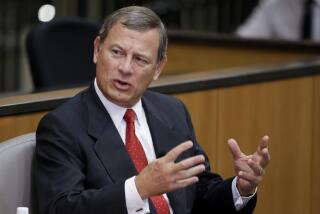Constitution Group’s Private Sessions Save Time, Burger Says
- Share via
WASHINGTON — Chief Justice Warren E. Burger on Thursday strongly defended a decision by an advisory commission he heads on the bicentennial of the Constitution to bar the public from its meetings.
“These are busy people,” Burger said of the 23 commission members. “And this is not a government agency in the ordinary sense.”
The chief justice’s remarks came in a free-wheeling, question-and-answer session following a luncheon speech on the bicentennial before the National Press Club. Among other things, Burger urged prompt congressional approval of a $20-million appropriation the commission is seeking to help the nation celebrate the 200th anniversary of the historic document.
Asked why the commission had conducted closed business meetings, Burger responded: “For the same reasons the board of directors of the Washington Post, New York Times and Associated Press hold their meetings in private.”
He said that the commission included “distinguished public figures” who would have to be “pretty guarded” in their comments if meetings were open to the press and public. Open meetings, he said, would take “three times as long.” He said there has been nothing in the meetings “that needs to be secret,” but “we just don’t have the time” for public meetings.
Public Hearings Planned
The chief justice indicated, however, that the commission would continue to conduct public hearings on proposals by governmental and private groups for bicentennial observances.
The commission was the target of a lawsuit filed by a public interest law group contending that federal law requires the commission to meet in public. A federal judge ruled last month that the commission could continue to hold closed meetings.
The Commission on the Bicentennial of the United States Constitution, as it is named, was created in 1983 to promote and coordinate the celebration and make recommendations to the President and Congress on the observance. Besides Burger, who is its chairman, the commission includes judges, members of Congress, local officials, lawyers, and academics among others.
On other subjects, the chief justice:
--Elaborated on previous statements he has made opposing a constitutional convention, saying that such a gathering would be a “grand waste” of time and that any changes in the Constitution should be made, as in the past, by amendments proposed by Congress and ratified by the states. Burger said he understands “the ladies were gearing up” in a renewed effort to secure passage of a 27th Amendment--the equal rights amendment.
Not a Threat
“That’s the way to go about it,” he said. “It would not pose a threat, but it would be a grand waste of time to hold a constitutional convention to start all over again. If they had one, I don’t think I’d go.”
--Refused to directly enter the recent public debate between Atty. Gen. Edwin Meese III and Justices William J. Brennan Jr. and John Paul Stevens over whether the court is properly following the intent of the framers of the Constitution. However, Burger specifically noted that the court had followed the apparent intent of the framers in a 1983 decision he wrote saying that state legislatures and Congress could continue to employ chaplains and begin legislative sessions with prayers without violating the separation of church and state.
The chief justice pointed out that in 1789 the first Congress voted to employ chaplains at the same time it was drafting provisions of the First Amendment that barred government establishment of religion. “How could you get a better idea of their intent?” he asked.
--Opposed the admission of television cameras to the Supreme Court and other federal courts, saying they would give distorted impressions of courtroom proceedings. “Television is essentially show business,” he said.
--Urged judges to levy fines against attorneys who clog the courts with frivolous cases. He noted that he and some other justices had voted recently in favor of fines in frivolous cases brought to the Supreme Court. “I hope that encourages judges elsewhere to impose such penalties and that it will be done widely,” he said.
More to Read
Get the L.A. Times Politics newsletter
Deeply reported insights into legislation, politics and policy from Sacramento, Washington and beyond. In your inbox twice per week.
You may occasionally receive promotional content from the Los Angeles Times.









